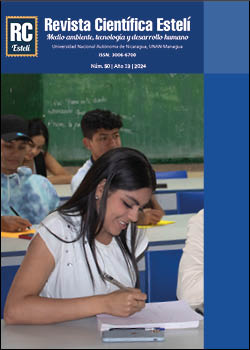A look at the toxicology studies that have been carried out in Nicaragua in the period 2001-2022
DOI:
https://doi.org/10.5377/esteli.v13i50.18471Keywords:
Toxics, poisoning, poisons, antidotesAbstract
A large part of workers are exposed from their different work environments to a variety of elements of chemical origin that are called toxic: any substance that produces harmful effects on the organism (ATSDR, 2019), whose effects on health are variable and not always immediate. This article presents a look at occupational toxicology from scientific research, as an important component that companies and occupational health professionals should apply in their occupational health and environmental assessments. For the development of this documentary review article, different literature review methods were applied, as well as scientific-technical information sites and information published in institutions that follow up on toxicology. In the methodology of documentary review and exploration of publications on the subject, four dimensions of review and analysis were implemented for the approach to toxicology from the focus of: conception of toxicology, role of the institutions linked to it, labor sectors most affected and research on the subject. The following databases were consulted: Google Scholar, Bireme, Pubmed, Latindex and indexed scientific journals such as: Scielo, Aetox, Revista de Ciencias Sociales; websites of national and international institutions such as the Ministry of Health, Nicaraguan Institute of Social Security, Ministry of Labor, National Commission for Registration and Control of Toxic Substances, World Health Organization, Pan American Health Organization and the International Labor Organization. Among the conclusions, occupational toxicology is a science that should be presented to occupational health professionals from their basic training to provide an adequate approach from different labor sectors, not only as a response to incidents generated by exposure, but rather in the prevention and protection of workers, thus reducing the occupational risk of diseases and accidents.
Downloads
446
HTML (Español (España)) 182
Published
How to Cite
Issue
Section
License
Copyright (c) 2024 Revista Científica de la FAREM-Estelí

This work is licensed under a Creative Commons Attribution-NonCommercial-ShareAlike 4.0 International License.
© Revista Científica de FAREM-Estelí

